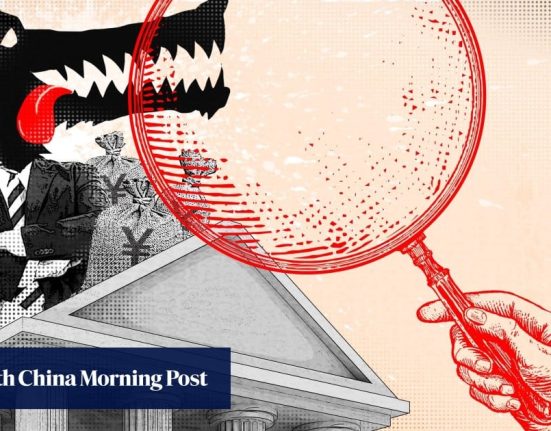The transactions of new homes in Beijing jumped 38.5 per cent year on year to 6,106 units in December, bringing the total volume of new homes sold across the city to 66,000 units, or 74.9 million square metres. Meanwhile, new home prices rose by 0.17 per cent year on year and the prices of pre-owned homes dropped by 0.63 per cent in the same period.
An increase in new home sales was driven mainly by improved supply, instead of demand, said Chen Wenjing, director of market research at China Index Academy. “Overall, residents are still quite cautious about buying homes, and as the market enters into its off-season in January, sentiment will fall even more,” he said.
Improving transport, favourable policies may boost Greater Bay Area home sales
Improving transport, favourable policies may boost Greater Bay Area home sales
Wang Xingping, senior analyst of companies at Fitch Bohua, a subsidiary of Fitch Ratings, said the growing sales figures were linked to more quality listings entering the market and selling at higher price points, and were in no way indicative of a broad-based recovery in new home prices.
“Unless there is substantial improvement in buyer confidence, we do not think the trend of price increases will continue,” she said.
The pre-owned housing market is faced with even greater headwinds, analysts said, as second-hand homes usually have longer transaction cycles, and the imbalance between supply and demand in the second-hand homes market is more pronounced.
Ordinary buyers eye China’s foreclosed home bargains as investors retreat
Ordinary buyers eye China’s foreclosed home bargains as investors retreat
“Pre-owned homes are already hard to sell,” Chen said. “This, coupled with the fact that expectations of household incomes are still shaky, and homebuyers are hesitant to increase leverage [to buy homes], is putting a dent in demand.”
Gary Ng, a senior economist at French investment bank Natixis, said it takes time for policy support to translate into improved confidence, which, at the moment, is dampened by lower inflation.
“Developers would have greater incentive to sell as quickly as they can, and home prices will most likely flirt with deflation in the next few months,” he said.
Why China’s local governments are encouraging upgrades by homeowners
Why China’s local governments are encouraging upgrades by homeowners
Gao Yueqiu, a manufacturing industry professional living in the eastern coastal province of Shandong, said that she is interested in buying a flat for her daughter who lives and works in Beijing, but is facing many challenges.
“One of the main ones is permanent residency, which grants individuals or households the right to buy a home in a given city,” she said. “In order for someone who was not born in Beijing to buy property in the city, they need to at least have a work residence permit, which is not very easy to get.”
China’s property sector will rebound in 2024, developer forecasts
China’s property sector will rebound in 2024, developer forecasts
When asked about the effectiveness of the easing measures, Gao said the rules were “generally positive” for homebuyers and for Beijing’s property market, but she expects prices to keep dropping for a while.
“After all, there is too much inventory, and the population keeps falling … That said, if you put your money in the bank, you’re still losing money. The economy is bad and people have no place to invest their money, so placing your bet on Beijing’s property might not be such a bad idea.”
Shanghai’s rich seek refuge in overseas homes amid domestic property sell-off
Shanghai’s rich seek refuge in overseas homes amid domestic property sell-off
“The top priority for the government … in 2024 is the stabilisation of the Chinese economy,” said Alfredo Montufar-Helu, head of the China Center for Economics and Business at the Conference Board, a global non-profit think tank.
“Last year’s Central Economic Work Conference [CEWC] made it clear that the government will maintain a targeted and measured approach towards its stimulus measures to support growth as necessary, but without exacerbating systemic risks.
“With respect to the property sector, the mantra that ‘houses are for living in, not for speculation’ was not included in the official CEWC readout. In our view, this suggests that authorities are likely preparing to implement a range of targeted stimulus measures to help the sector bottom out from its current downturn and stabilise, which we believe is imperative for confidence levels to improve.”
China Index Academy’s Chen said that local governments could roll out more demand-side measures this year, including relaxing purchase restrictions on a “district-specific basis” in China’s first-tier cities, as well as providing subsidies to residents of lower-tier cities to encourage purchases.







